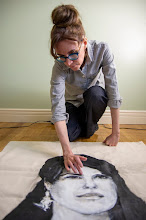“…feminist art is not an easy concept to digest for the majority of people.”—Maura Reilly
On the week-end, I visited Booklyn Artists Alliance in Greenpoint, Brooklyn, in part to see if the copy of Our Bodies, Ourselves I donated earlier this year to Jen Kennedy and Liz Linden's Book Swap… had been swapped. It hadn’t.
I wish I could say that I loved the current exhibition, Brass in Pocket (September 13-October 27) because it combines art, feminism, bibliophilia, and self-publishing (it culminates in the production of a zine including external submissions). Alas, when I passed back under the funky archway of books in Booklyn’s office space, I left as perplexed as when I arrived by the online curatorial statement.
Seven female artists are included in the show but in the list of exhibiting artists on the website (see image) and in the curatorial statement, the roster is said to include not seven but six artists (Susan Fang, Liz Linden, Lynnette Miranda, Caroline Paquita, Catherine Stack, and Tamara Waite-Satibanez, all of whom are New York-based). As a fellow Canadian, I find the exclusion of Toronto-based Jen Kennedy concerning. As a feminist, I find lack of recognition for a female artist to be the opposite of feminist.
Curators Aimee Lusty and Kate Wadkins explain that their original intention was to showcase feminist artists (defined as artists who encounter sexism in their personal and professional lives, regardless of whether they create feminist work). In studio visits, unspecified feminist themes surfaced, but Lusty and Wadkins decided to emphasize transcendence of subject matter, experimentation within various media, and draftsmanship (ahem) instead, seeing feminist art as a narrow focus. The statement ends by aligning the spirit of the show with that of Book Swap… in saying that at the heart of Brass in Pocket is the viewer’s ability to engage with feminism on his or her own terms.
The fact that the artists face gender-based discrimination at home and work doesn’t make them feminists; it makes them women. Doing something about it would make them feminists. Based on their online presence, only three of the seven artists self-identify as feminists. If the others do indeed consider themselves to be feminists, it would be ideal for the artists to articulate it. In a world where role models like Susan Sarandon avoid the ‘f word,’ more allies are needed. (Kudos to artist Suzanne Lacy for addressing this issue head-on in her collaborative performance in Prospect Heights on Saturday). Laying bare the evolution of the curatorial approach, as Lusty and Wadkins have, has the unfortunate effect of casting the show as feminist lite at best and as a rejection of feminist art at worst. They may have been better off releasing a statement that addressed formalism but not feminism at all.
My knee-jerk reaction was likely exacerbated by the book I happened to be reading the day I learned of the show. In the opening chapter of Women, the Arts and Globalization: Eccentric Experience, Angela Dimitrakaki notes that on a global scale, women have less brass in pocket* than in the past, in addition to being sexual commodities, so it’s critical to maintain the connection to politics in feminist art history—a discipline that is market-driven through tourism-generating biennials and tuition-funded academia. Regrettably, at least according to Dimitrakaki’s line of reasoning, Brass in Pocket has no apparent politics. Its curation invokes a powerful concept but stops there. Because, as Maura Reilly says, “feminist art is not an easy concept to digest for the majority of people” (p. 35), what feminist intentions the curators had may become lost when people engage with the show on their own terms, without even wall labels to help them along.
*British slang for money; a reference to The Pretenders’ song, Brass in Pocket.
Sources:
Connie Butler, Amelia Jones, and Maura Reilly (in dialogue). “Feminist Curating and the ‘Return’ of Feminist Art.” In The Feminism and Visual Culture Reader, Ed. Amelia Jones. Routledge, 2010, pp. 31-44.
Angela Dimitrakaki, “Gendering the Multitude: Feminist Politics, Globalization and Art History”. In Women, the Arts and Globalization: Eccentric Experience, Eds. Marsha Meskimmon and Dorothy Rowe. Manchester University Press, 2013, pp. 15-25.
Image: reproduced in 2019 via fair use/dealing. Source: https://booklyn.org/event/brass-in-pocket/
Monday, October 21, 2013
Brass in Pocket at Booklyn Artists Alliance
Subscribe to:
Post Comments (Atom)


No comments:
Post a Comment